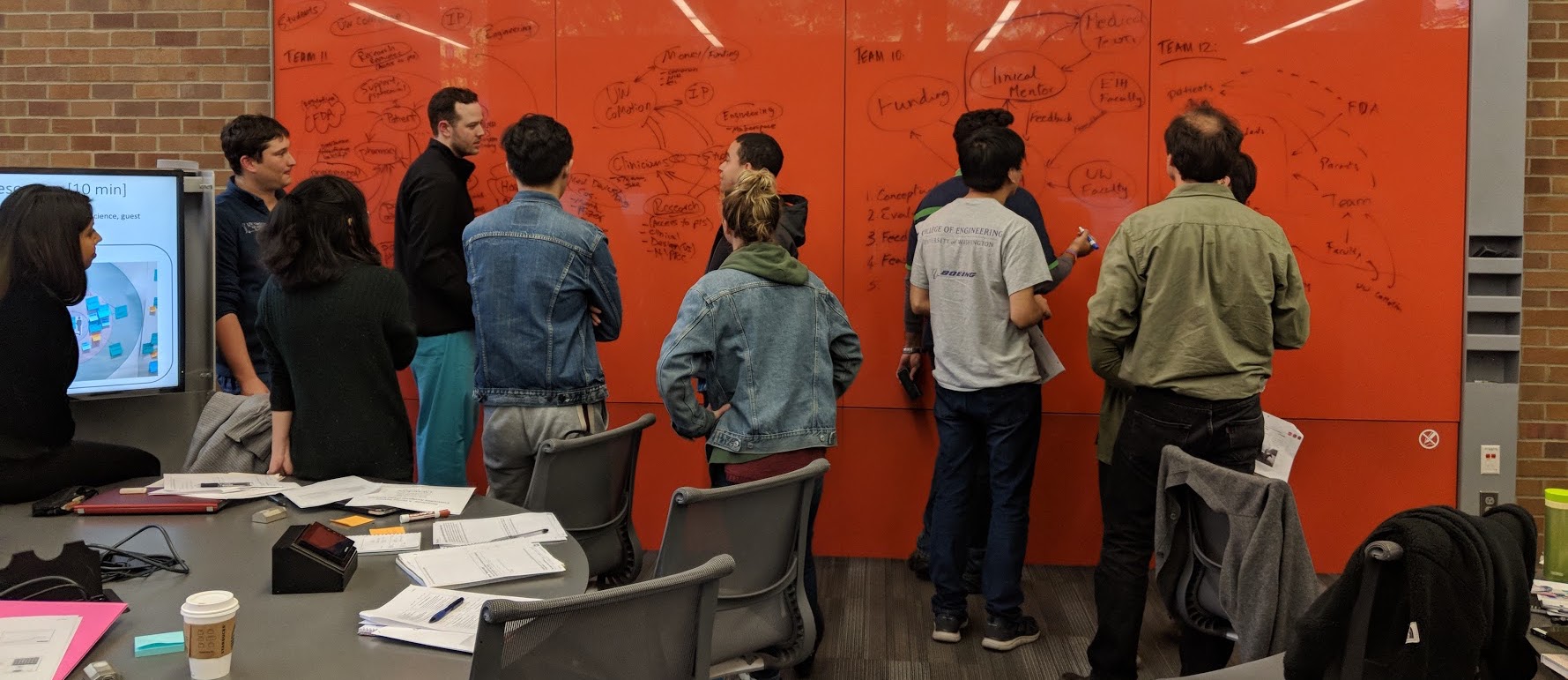
Undergraduate students from across the College of Engineering can participate in the Engineering Innovation in Health course sequence where they develop technical solutions to health or healthcare challenges. The course sequence starts with an introductory bootcamp for medical device design and culminates in a capstone project where you design, construct, test, and evaluate a prototype medical technology or device.
Your major determines the specific courses you take to participate. The courses for mechanical engineering students are outlined below. Students participate in a three-quarter capstone design sequence, where you earn credit while working in interdisciplinary teams. The teams are advised by engineering faculty as well as mentors in the health sciences. The goal of this course sequence is to design, fabricate, and test a working prototype device that meets a clinical need.
We welcome students from any engineering department, as well as students from the sciences, health science, business, and more. Students from departments other than mechanical engineering should contact EIHealth@uw.edu to learn which courses they need to take to participate.
Mechanical engineering courses
Mechanical engineering students can take a single, autumn quarter introductory course, ME 414, or choose to take the three-quarter course sequence from autumn to spring (ME 414, ME 494, and ME 495). If you are entering your senior year and choose to complete your capstone senior design requirement in Engineering Innovation in Health, then you will earn a total of 9 credits over three quarters and can meet the ME 493/414 and ME 495 requirements.
Autumn
ME 414: Engineering Innovation in Health
- 3 credits
- Counts toward graduation as capstone credit or technical elective
- Can satisfy requirement for ME 414: Introduction to Mechanical Design
- No prerequisites
An introductory bootcamp for medical device design, focused on how engineers contribute to the development of medical devices. Topics include fundamentals of design, need finding, the influence of engineering on medicine and health sciences, regulation, insurance reimbursement, economics and market evaluation, and intellectual property (i.e., patents). The course involves field trips to UW Medicine, where you will interact with medical technologies and observe medicine in practice.
You will work with a team, made up of students as well as mentors from medicine and engineering, on a quarter-long pilot project evaluating potential topics for capstone design. At the end of this course, medical challenges will be selected for continuation in winter and spring quarter and capstone teams will be formed.
Winter
ME 494: Engineering Innovation in Health Design Preparation
- 3 credits
- Counts toward graduation as capstone credit or technical elective
- Prerequisites: ME 414: Engineering Innovation in Health
Team-based design of solutions to challenges in healthcare. The second course in the Engineering Innovation in Health senior capstone design project sequence. Student teams define the clinical need, identify core functions and design specifications, ideate and evaluate designs, and develop engineering models of designs.
In some years, ME 494 is oversubscribed and students are asked to submit a short survey to enroll. Note that students must enroll in the Spring quarter Engineering Innovation in Health course.
Spring
ME 495: Mechanical Engineering Design, Engineering Innovation in Health
- 3 credits
- Capstone design course
- Prerequisites: ME 414: Engineering Innovation in Health and ME 494: Engineering Innovation in Health Design Preparation
A team-based capstone design course focusing on design, construction, test, and evaluation of a prototype medical technology/device. Emphasis is on modern design processes and the use of engineering standards.